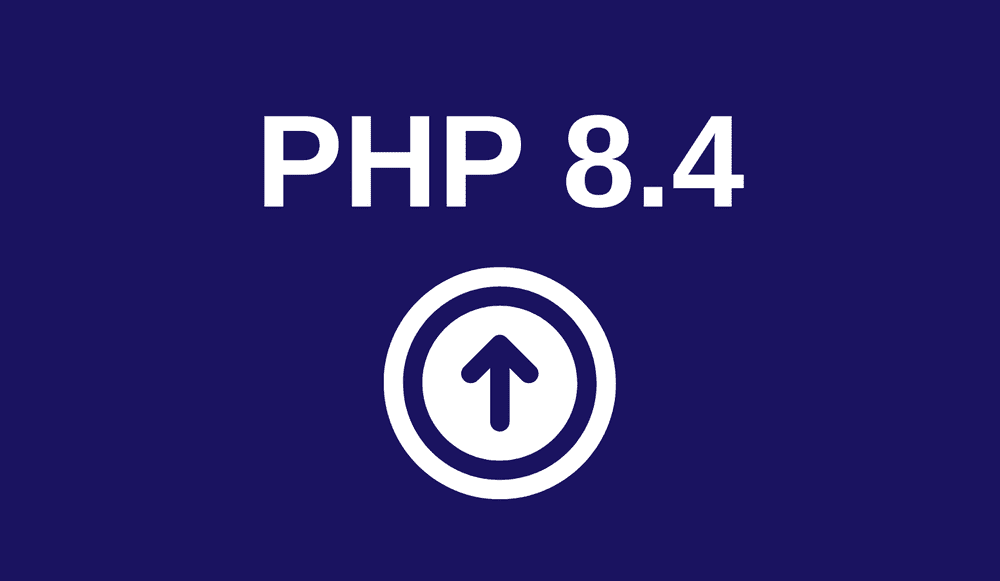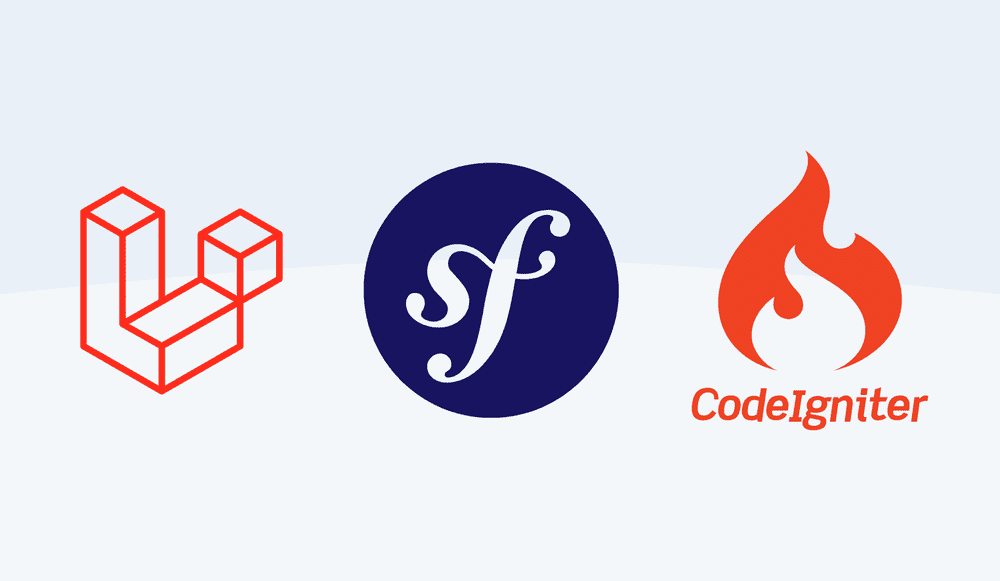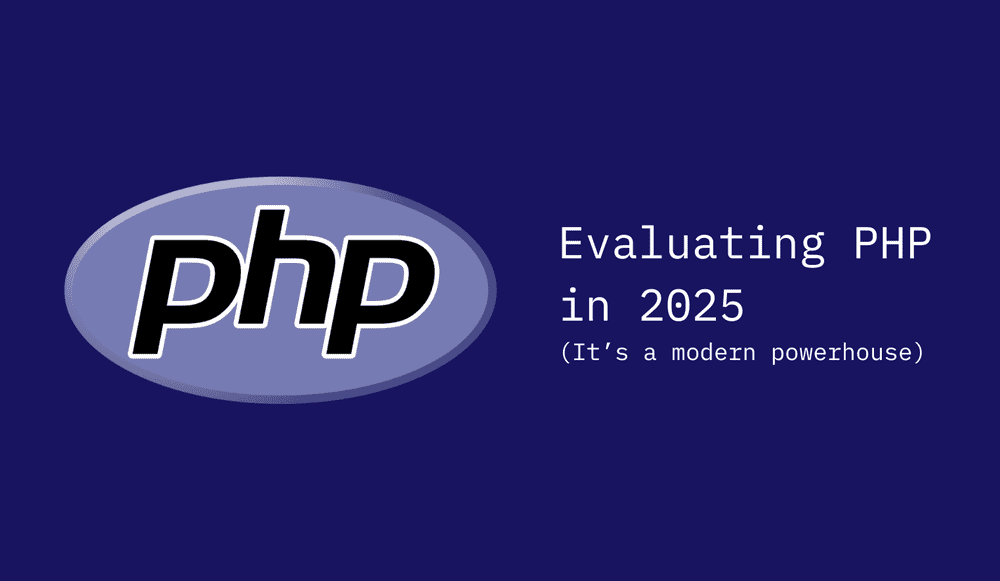Is PHP still relevant in 2024?
Update for 2025: Is PHP still relevant in 2025?
When Rasmus Lerdorf first introduced Personal Home Page Tools, or PHP as we know it, to the world in 1995, few could have predicted its meteoric rise to dominance. Flash forward to its peak in the 2010s, PHP powered over 80% of the world's websites, including giants like Facebook and Wikipedia. Furthermore, a powerful ally, the PHP Foundation emerged in 2021 to support the growth of the language and revert declining popularity.
Yet, the echoing chatter of the digital community in the past decade has increasingly questioned PHP's relevance. Should you still be using PHP in 2024? Is it a good programming language for your software product today?
New languages, paradigms, and web development technologies, from Rust's promise of memory safety to Node.js’s event-driven non-blocking I/O, have reshaped the contours of the software development landscape.
Now, in 2024, as we stand on the cusp of another era of digital evolution, it's worth revisiting this age-old debate. Has the sun finally set on PHP and PHP developers, or does this resilient scripting language still have some tricks up its sleeve?
Being curious myself, I decided to learn as much as possible on this topic. This lead me to dive into statistics, benchmarks and code repositories. Reading long threads, comments and posts. Eventually, meeting with computer science students and visiting local PHP meetups. What did I find out? Is PHP still relevant in 2024? Or to state it more clickbait-like — Is PHP dead in 2024? Let's see...
PHP in Numbers: Current Statistics
When we talk about programming languages, numbers often tell a compelling story. But to truly understand the ongoing saga of modern PHP code and programming language, we need to not only read the cold hard statistics but also learn what stands behind them.
How many websites are still powered by PHP in 2024?
If you have any interest in PHP, you might have heard the famous statistic that PHP fuels 80% of the whole Internet. But how true is it as of today? According to the latest metrics from W3Techs, in 2024, PHP still powers 76.5% of websites where the server-side programming language can be discerned. And that's less than a 1% decrease over a year (77.3% as of 2023). Impressive? Yet, numbers in isolation can be misleading...
When we take a closer look, we notice that PHP dominance, although still true, decreases when it comes to more popular websites:
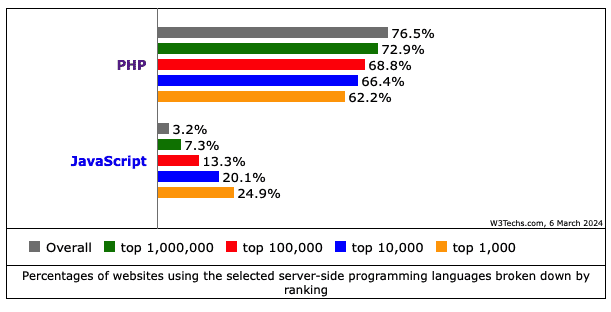
Why? A significant portion of PHP's presence can be attributed to CMS platforms like WordPress, Joomla, and Drupal. With WordPress alone powering over 43% of the web and a plethora of small blogs, it's evident that PHP's legacy as a programming language is intertwined with the success of these platforms.
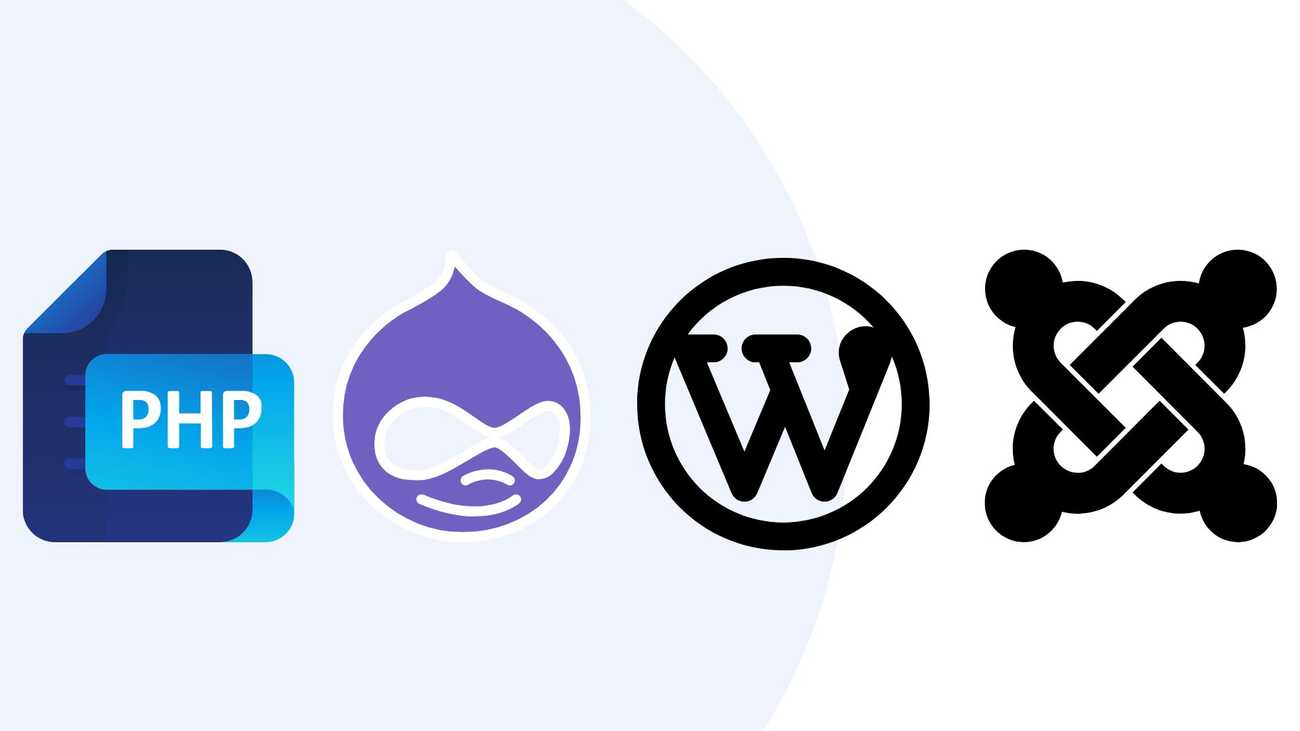
The growing role of JavaScript as a server-side programming language can probably be attributed to the increasing popularity of solutions like headless content management systems and static site generators. Both of these trends have started to compete with oldtimers like WordPress in the content creation market.
But will these eventually replace the PHP-based solutions? It is possible, but in my opinion, it won't happen anytime soon.
Actually, quite recently I had to decide on a CMS solution for my hobby travelling project. And although at Accesto we mostly use JS-based static site generators for content-type websites, I selected... WordPress. Why? Because when it comes to simplicity of use, ease of installation, and availability of ready-to-use templates and plugins — it's still hard to compete with WP. Result? My page was ready within just a few hours.
PHP-based websites usually do not require even a single skilled PHP developer to be built. But this language can be used for much more complicated software than just a static page. In 2024 you may be thinking of choosing PHP as a main web programming language for your SaaS or other digital product. Wondering if it is a good idea? Let's have a look at PHP development from a broader perspective.
How many developers are using PHP in 2024?
According to the JetBrains survey, in the last 7 years 20-30% of developers have used PHP language. Is it much? Yes? No? Maybe? Compared to 60-70% achieved by JavaScript, or Pythons 50%, it may seem like a relatively small number. Yet, you should remember that PHP was never supposed to be a one-language-fits-all solution.
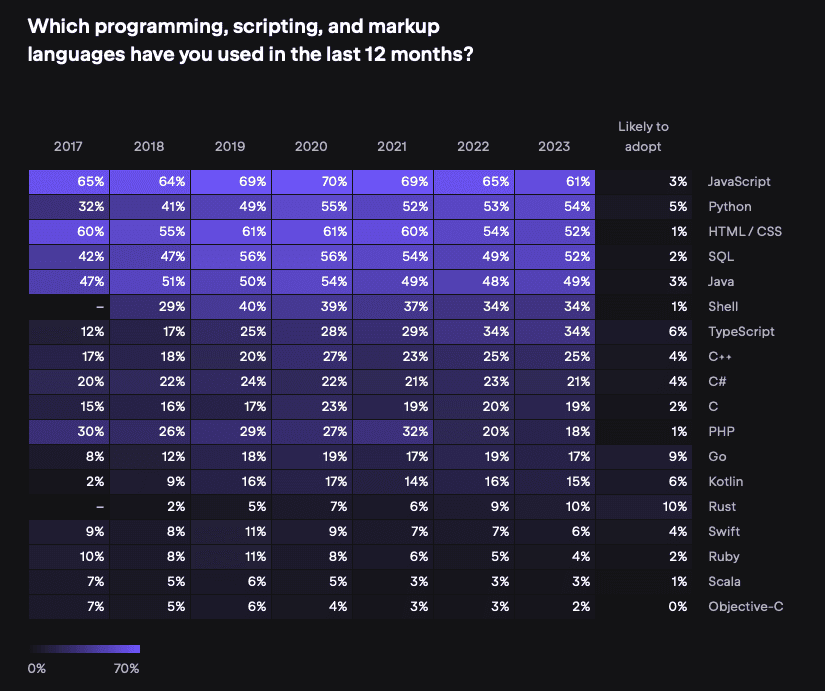
While JavaScript nowadays can be used almost everywhere, PHP is still a back-end programming language for web development. It is not supposed to compete with other languages on a front-end side or in data science (like Python) or in... you name it. Software engineering today has many flavours and fuels many different areas of life and business.
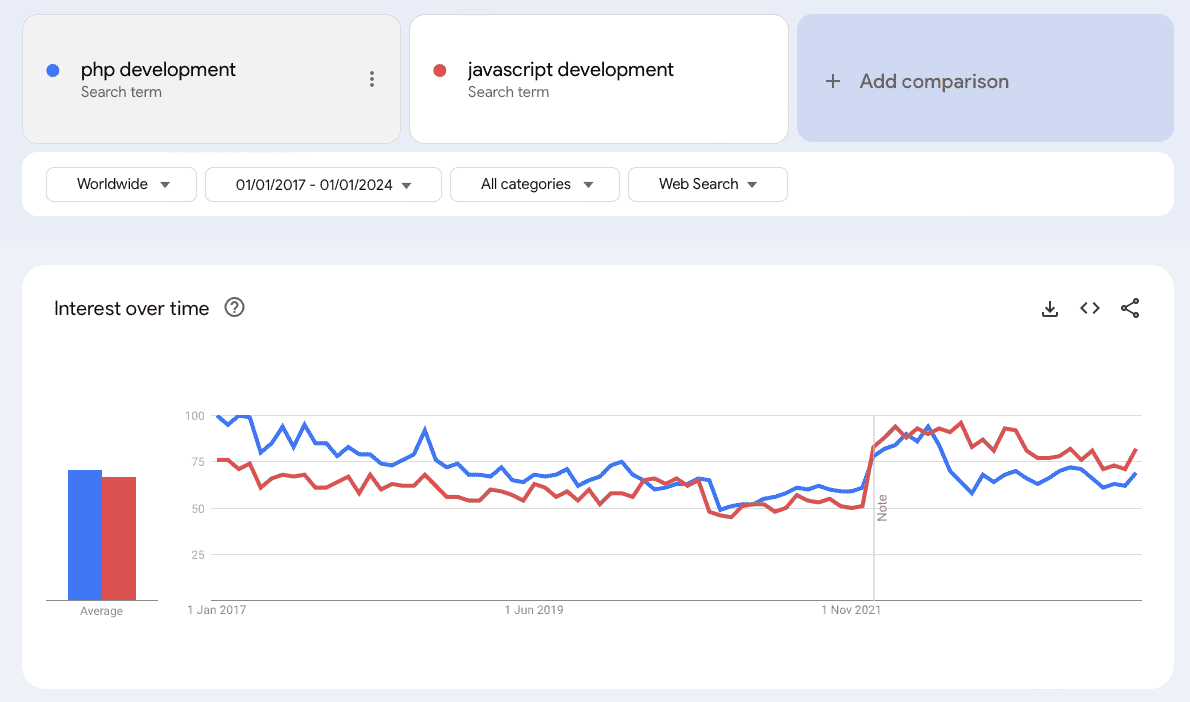
Google Trends shows that during the last 7 years, JavaScript development has indeed increased its popularity. But at the same time, trends do not show any major drop in PHP development significance. Software engineering has become more and more important in general. The same tool (Google Trends) shows that software development as a search term almost doubled in the previously mentioned period. The majority of these are completely new areas of IT like machine learning, big data, blockchain or generative AI and large language models. When PHP was created, some of these were not even discovered yet, and for sure were far from being popular topics among developers worldwide.
So, from that perspective, is PHP still relevant in 2024? I would say that these 20-30% look like a decent share of the software development ecosystem, and PHP remains a very important player. It is made for back-end web development - and that's where it thrives.
Actually, I would even say that it is quite an impressive result, considering that the language itself is almost 30 years on the market. And, this isn't merely a statistic — it's an affirmation. It speaks to PHP's longevity and adaptability, enduring where many other technologies have faded into obscurity. In 2025 PHP will be turning 30 years old and only a great tool can live through such a dynamic market and still maintain its solid position.
How big (and how active) is the PHP community in 2024?
While statistics from platforms like GitHub show over 500 contributors to PHP's core in the past year, what’s truly remarkable is the nature of these contributions. They aren’t merely bug fixes or minor patches — many are visionary enhancements, propelling PHP into the modern age of web development for PHP developers.
The PHP RFC (Request For Comments) process gives us a window into this evolving vision. JIT compilation has the potential to dramatically boost PHP's performance, making it competitive with traditionally faster programming languages.
PHP's lasting power isn't just about its features, but its dedicated community. A language's strength comes from its active supporters. The lively discussions, many open-source projects, and ongoing innovation keep PHP not just in the game, but often leading it.
What Keeps PHP Alive?
The Legacy Effect
Large-scale enterprises like Facebook, Slack, and Wikipedia had their foundations deeply rooted in PHP. Even if they've since diversified their tech stacks, PHP remains an integral part of their infrastructures. Think of PHP as the keystone in a massive structure to solve problems: even if newer materials and designs emerge, the foundational stone remains critical to the building's stability.
Facebook's HHVM (HipHop Virtual Machine), a JIT compiler originally designed for PHP, represents this idea. While Facebook has now shifted its primary focus from PHP code to Hack for HHVM, this venture underscores how integral PHP was to their growth and how enterprises can spur innovations around a language.
CMS Dominance
It’s challenging to discuss PHP without acknowledging its indomitable association with dominant Content Management Systems. WordPress, Joomla, and Drupal - they are to PHP what the Big Three automakers are to Detroit. Integral, iconic, and foundational.
Given that WordPress alone claims over 65.1% of the global CMS web market, and Joomla and Drupal hold significant portions themselves. These CMS systems act as PHP's advocacy champions, ensuring that the language remains not just in use, but dominant. And it’s not just about numbers; these platforms are communities in their own right, fostering plugin development and themes.
Last year WordPress turned 20 (belated happy birthday!). One may argue that instead of becoming an adult it already became an old man. But that's not exactly true. With regular upgrades, major versions being released every few years and a packed roadmap... it's nowhere near the retirement.
Continuous Evolution without Revolution
To merely dub PHP as an "old" language would be doing it a disservice. With the release of PHP 8 and its subsequent iterations, the language has proven its commitment to staying abreast with contemporary demands. The introduction of the JIT compiler is a testament to PHP's dedication to performance, potentially rivalling traditionally "faster" languages.
Furthermore, features such as union types, named arguments, and attributes in PHP 8 show a clear alignment with modern programming paradigms, offering developers a more concise and expressive syntax.
Of course, many languages already have these features. Nothing new you may say, but that is one of the PHP advantages! PHP is one of the most stable and predictable technologies you can choose for your web product.
Modern web development is considered a very fast-paced and ever-changing environment. With new tools emerging and disappearing every day. With new versions of frameworks being released every few months - especially in the JavaScript world. This means that you have to constantly upgrade your tech stack to keep it up to date with the versions that are still maintained.
And on the other side, we have PHP - with its just 7 major versions in 30 years! While being actively developed as a programming language, it does not introduce any revolutions. It evolves, gradually adapting what proved to work well in other programming languages. Stability and ease of keeping up to date is a huge advantage of PHP and its frameworks. Just to mention Symfony framework - that offers long-time support (LTS) versions with 3 years of maintenance and 4 years of security fixes!
Lack of better alternatives?
I am aware that this is a very arguable topic. Cause many popular programming languages can easily rival PHP in many fields. But when it comes to back-end web development I still don't see any PHP-killers. Some can compete, but in many cases, they won't be a better choice.
Python? Pretty good frameworks and packages, but 3 times slower than recent PHP versions. Java? Bigger entry threshold and in general more expensive to develop and maintain - good for large corporate or banking applications. JavaScript? Good for a front-end, but its back-end stack is still underdeveloped with its minimalistic frameworks providing usually just a basic feature set.
JavaScript is often mentioned as the best alternative to PHP when it comes to back-end web development. I agree, but it's still an alternative to me, not a primary choice. It is tempting to see JavaScript as a universal language that will one day replace other languages in web development. You just hire JS developers and you can let them code both the front-end and the back-end, sound like a great solution? Maybe sometimes. But so far I have only heard the failure stories with that approach. Back-end and front-end developers need different skills and knowledge - language is secondary.
Modern Challenges Facing PHP
PHP holds a strong place in web development, but it faces new challenges. With rising performance expectations and changes in technology and developer tastes, the road ahead is tough. Let's explore these current challenges and what they mean for PHP's future.
Performance Concerns
Today, speed is essential. Languages like Go and Rust set high-performance standards, with Go excelling in handling multiple tasks and Rust being highly efficient in memory use.
PHP 8 has improved speed, but when it comes to tasks like data processing, Go and Rust can be faster. However, PHP is still great for web-related tasks, especially when combined with modern servers and caching. This makes it easier for PHP developers to get their work done.
Emerging Technologies
Technology is always changing, with trends like Serverless, Containerization (like Docker), and Microservices becoming more common. It's important to see where PHP fits in this.
Serverless technology, which adjusts automatically based on web requests, sees languages like JavaScript leading the way. PHP is still trying to adapt to this trend, although platforms like Bref are helping.
PHP works well with Containers and Microservices. Using Docker, PHP apps can be easily packaged, and PHP microservices fit well into larger systems. However, some newer languages designed for these trends might be more efficient in the future.
Developer Mindshare
Web developers are often drawn to the latest technologies. As educational programs emphasize new trends, interest in PHP has slowly decreased. Sites like Stack Overflow show more questions about languages like Python, Rust, and Go, suggesting developers are moving to newer tools.
However, it's important to separate trends from real-world needs. While languages like Python are popular, the large PHP ecosystem, with many CMS platforms and big systems, means PHP skills are still in high demand in jobs.
When I was a student myself, software engineering was all about Java, C++ or... PHP for web. Since then many new areas of IT and software emerged. Nowadays learning PHP is no longer seen as one of the few main routes to take. It is just one of many, maybe not the most trendy one, but still needed in the job market.
After a huge drop due to the pandemic, attendance at the PHP meetups and conferences is getting back to its pre-covid times. There were moments when there were more free pizzas available than PHP developers 😉 But the active community survived, and is again meeting to share the knowledge and learn PHP together. However, I must admit that the average age of PHP developers attending these did increase.
Legacy code
Almost 30 years of PHP development is a huge legacy. But also a legacy in its negative meaning. After at least a few start-up booms in that period, many software products were built and survived on the market to this day. Not all of them were regularly upgraded and refactored. This unfortunately led to an accumulation of technical debt in PHP projects and so-called legacy code.
This may give PHP a bad PR because many developers thinking of PHP instantly see piles of legacy, outdated code. It's not the developers' favourite to deal with. But it does not mean that the PHP codebase has to be old and full of unpaid tech debt. It is a language like any other, and all the good development practices can (and should!) be applied in PHP (like SOLID principles).
And I may know a thing or two about it, as here at Accesto we specialize in PHP modernization. So if your PHP-based software product may need some uplift feel free to reach me.
PHP in 2024 for the Web Development Landscape
As the web continues to evolve, the narrative of PHP's relevance takes intriguing turns. Not just a language, PHP’s ecosystem, supported by robust frameworks and innovative patterns, is painting a vivid picture in the web development canvas. But how does this fit into the current web landscape?
Frameworks: The Vanguard of PHP's Evolution
There's no denying that PHP's continued relevance owes a lot to its powerful frameworks. They epitomize the language's adaptability and drive its narrative forward in an ever-evolving tech domain.
Take Laravel, for instance. Laravel's expressive syntax, combined with features like an ORM (Eloquent), a powerful queue system, and built-in security measures, makes it a darling among developers. The recent adoption of the Swoole and RoadRunner engines, allowing for high-performance asynchronous task handling, is a testament to its commitment to evolution.
Symfony, another behemoth in the PHP framework ecosystem, continues to be the backbone for platforms like Drupal. Its modular component system and the Symfony Flex approach ensure that developers have the freedom to build both micro and monolithic applications seamlessly.
In 2025 Symfony will turn 20 years old, if two decades ago you would have decided to build your product on Symfony — today it could still be constantly growing and improving. In my eyes, that's a sign of a strong and stable technology. Not to mention it's 4 years of security updates for each LTS version!
These frameworks aren't just responding to the times - they're often setting the pace, pushing PHP into realms previously uncharted and ensuring it isn't left behind.
Headless CMS & API-Driven Development
The decoupled, or "headless", approach to content management has been gaining traction. Here, the content management back-end is decoupled from the front-end, allowing for more flexible content delivery via APIs. PHP, with its deep roots in the CMS world, has had an interesting journey in this space.
Platforms like Drupal have embraced the headless approach, providing robust API layers that can seamlessly integrate with modern front-end technologies like React or Vue.js. Similarly, WordPress, through its REST API, offers a headless experience, proving that the old dog indeed has some new tricks.
These strides in API-driven development not only underline PHP’s adaptability but also bolster its position in a web that's becoming more decoupled and modular by the day.
The JavaScript Ecosystem
JavaScript, especially through Node.js, has grown rapidly. Frameworks like Next.js provide comprehensive solutions for various web tasks. So, where does PHP stand in this JS-led environment? It's more about collaboration than rivalry. Tools like headless WordPress and Drupal let developers combine PHP's content management with modern JS front-ends. With PHP, we also get mixed solutions like Laravel Livewire, blending server-side strength with client-side responsiveness. Despite JavaScript's widespread use, especially upfront, PHP has adapted to work well with it.
Advantages That Still Make PHP Relevant
In a time of fast-changing tech, it's impressive that PHP, almost 30 years old, remains popular. Despite emerging languages and tools, PHP has unique strengths that keep it central in web development.
Ease of Deployment: Simplicity in a Complicated World
In a time where deployment pipelines can sometimes be overwhelmingly complex, PHP looks back to simpler times. No need for convoluted container orchestration or intricate CI/CD setups. Often, it's as straightforward as uploading your files to a server and, voilà, your site is live!
<?php
echo "Hello, World!";
?>Drop the above in an index.php file, upload, and your message greets the world. This simplicity, often taken for granted, can be a breath of fresh air, especially for those looking to bring their ideas online without diving deep into the intricacies of modern deployment strategies.
It doesn't mean that in 2024 I recommend skipping all the CI/CD stuff and sticking to FTP deployments. Huh, haven't seen it for ages. But it is still possible, the entry threshold is low. So if you need a very basic PHP script to be running online, just write it and upload it to one of the web hosting providers. PHP can be as simple as that - no transpilers, task runners or orchestrators. But it can be used together with way more modern approaches and modern languages.
Strong Standard Library: PHP's Swiss Army Knife
Over the years, PHP has amassed an impressive standard library, replete with functions and extensions covering a vast array of functionalities. From manipulating arrays and strings to handling dates, images and even communicating with databases, PHP’s built-in toolset is both comprehensive and robust.
The convenience of having such a versatile toolkit readily available means developers can be productive right off the bat, without the constant need for third-party libraries or tools.
The Learning Curve: The Gentle Ascent of PHP
Despite its age and sometimes maligned quirks, PHP continues to be an excellent entry point for budding developers. Its syntax is forgiving, its errors (mostly) comprehensible, and the instant feedback loop of writing code and seeing immediate results is invaluable to those taking their first steps in programming.
Resources like PHP: The Right Way and the expansive official documentation further smoothen this learning journey, offering guidance and best practices. In an age where tech stacks can be intimidatingly vast, PHP's gentle learning curve remains a compelling reason for its continued relevance.
Boring is good!
In the whirlwind of modern web development, where tools emerge and vanish overnight and frameworks update frequently, PHP can be seen as a calming presence. With only 7 major versions in 30 years, PHP stands as a beacon of stability amidst the chaos.
Rather than chasing revolutions, PHP evolves steadily, incorporating proven practices from other languages. Its frameworks, like Symfony, offer extended support, ensuring maintenance and security fixes for years. So, while others scramble to keep up, sometimes, boring is just what you need. Especially for the back end of your SaaS or any other web application.
At Accesto, we provide full-stack solutions for software product development and modernisation. We have been doing it for over 14 years, and from that perspective, I can confirm that this "boredom" is exactly what many software products need. Keeping the JavaScript-based front-end up to date may be a constant struggle. New versions are released every few months, libraries and packages get depreciated, and no replacements are provided... huh! Opposed to that, we have never had any serious issues with being up to date with PHP-based back-end development.
Just to give you two examples from our case studies. How long does it take to get rid of an old AngularJS from the SaaS application? 6 years! And how about upgrading & refactoring the whole PHP back-end of a SaaS product of similar complexity? Just 2 years. That's 3 times faster!
Mature frameworks
Already mentioned it a few times, but worth to highlight here as well. PHP has brilliant and mature frameworks like Symfony and Laravel. With a huge feature set, a predictable and active development process and a great roadmap. Very stable, secure, and reliable. With long long official and also community support. Allowing great development speed and decent development costs. A perfect choice for modern web development overall. No longer just for websites or startups, but also for serious enterprise-level applications.
So...is PHP still relevant in 2024?
First off all, let's see the comic from the future 😉:
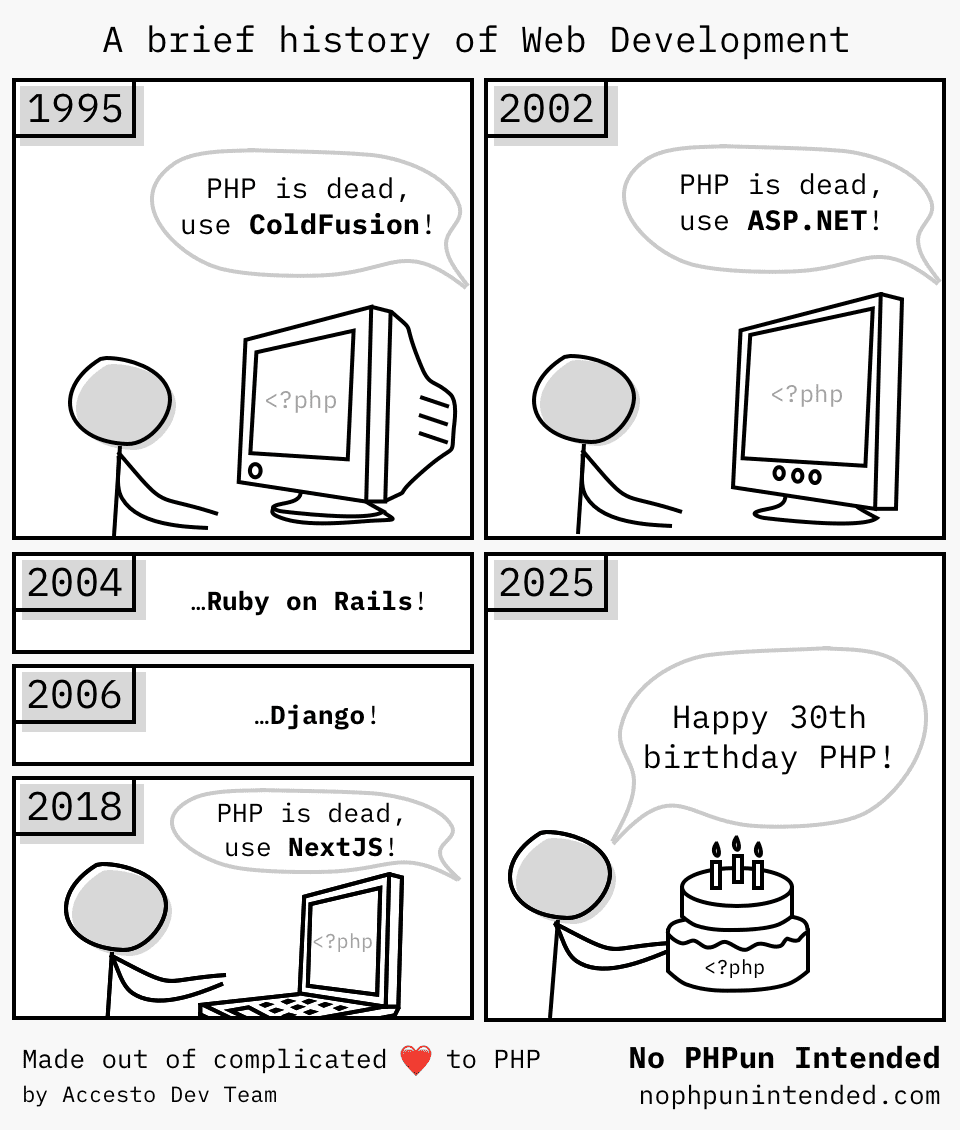
The tech world is always changing. There are so many new technologies and frameworks rising and falling, creating that endless hype cycle — some might even not be aware of PHP, I even recently heard from a computer science student: “PHP? never heard of it — must be something very recent”. But, amid these changes, PHP has been a constant, much like an old tree among new sprouts. It's a nod to web development's past while still being part of its future. But where does PHP stand today?
Calling PHP outdated is an oversimplification and saying it is a dead language is just wrong.
Sure, PHP is no longer a top choice among developers and computer science students. It's not trendy, it has nothing to do with AI, big data, data mining, blockchain or ChatGPT. However, in 2024 it still stands out among the most popular programming languages for web development. It was created for a particular purpose, and 30 years later it still fuels websites and web applications well. Constantly powering almost 80% of "the web" and, from a broader perspective, still being used by 20% of all the developers.
Its widespread use in hosting, easy deployment, rich features, great frameworks and beginner-friendly approach make it last. These are not just past achievements but current strengths that many rely on. Moreover, in the last 30 years, PHP has grown, matured, and become a good solution not only for websites but even enterprise solutions. PHP's transformation from a basic online tool to a powerful language that supports large platforms shows its adaptability. With ongoing updates, like PHP 8, it's evident that PHP isn't slowing down.
Technology isn't just about being new; it's about solving problems. PHP might not be the latest, but as long as it addresses needs, it has a secure spot in web development and the PHP community. Many projects were built in PHP long ago, this is something that cannot be easily changed, and frankly, sometimes staying with PHP is the best solution, and that already speaks volumes about the state of PHP.
While we should welcome new tech innovations, we shouldn't forget the lasting impact and adaptability of PHP. Its long history is a testament to its flexibility, community support, and constant relevance in an ever-evolving industry.
One thing I can say for sure — if your app is written in PHP — there is no reason to be afraid for the future of its technical development. And there is a plethora of good reasons someone can decide to build a new project on PHP. If you are looking for someone to refactor, maintain or create your project with — don’t hesitate to contact us, you’ll hardly find someone more experienced in the matter.

